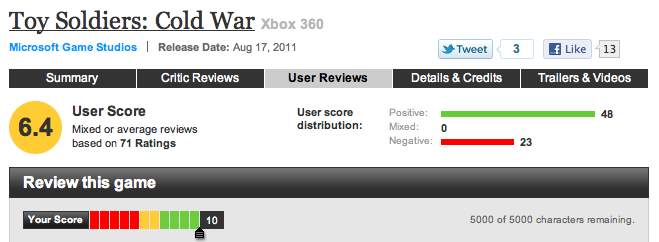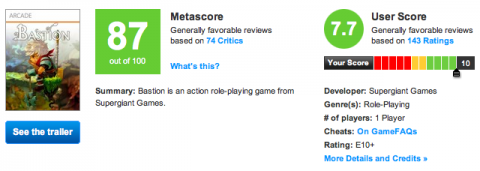
Signal Studios had a problem last week.
The tiny developer of Toy Soldiers: Cold War discovered its game had been hit with a series of negative, score-only (meaning no text) user reviews on Metacritic overnight, dragging its overall user rating down. While the scores assigned by critics are important, so are user reviews--anyone visting Metacritic is free to sort games by user reviews, too.

"There is a rash of fake negative user scores going about Metacritic and it hit TS:CW (and other games)," said Signal Studios community manager Logan DeMelt last week. "This means we need to hear your voice!"
DeMelt started mobilizing fans to add more reviews to the pile, incentivizing them with free download codes for Toy Soldiers: Cold War.
"If you write a user review," he said, "just being honest (we aren't bribing for positive) we will do the following: You write a review & post it, and we will put your name in for a chance for a prize on Friday. Every 10 new posts, we will drop a code out."
Of course, there are problems with this approach, especially in terms of the perception of a developer asking people to write reviews, albeit not advocating positive or negative, by dangling prizes around. DeMelt even got some Twitter flack about the concept from a friend, Sucker Punch community manager Colin Moore.
When I talked to Signal Studios president and creative director Douglas Robert Albright III on the phone last week, he told me he'd asked DeMelt to stop the promotion, understanding how people might interpret it.
"It doesn't matter what your intentions are, it's what the perception is," said Albright. "If that's the perception, then we'll just stop doing it. Because, honestly, he [DeMelt] had no intention of bribing people to get good scores."
"It was actually my fault," he continued. "I looked at the Metacritic and contacted them and told them 'This has been spammed.' We're not a bunch of dudes with a bunch of money laying around or whatever. It affects us, right? You can search by user scores and stuff like that. It's clearly spam. Metacritic just responded with this generic thing. All the intent was 'Well, this isn't our fault, we're just going to go on Metacritic and [ask users to] review the game.'"

Like it or not, Metacritic has become important to the games industry. It's a system with faults, and one that's come under enormous criticism over the years. But game publishers have few ways to determine success outside of sales--so they turn to Metacritic. Metacritic determines bonuses and royalty payouts for many. Thus, developers have reason to pay close attention.
The situation prompts hard questions for developers, especially small ones with financial destinies tied to something partially out of its control. There are few options. Asking for reviews could be perceived wrong, but what do you do if the negative reviews seem fake? How do you prove that? If you can't prove it but know you're right, do you gamble the possible backlash?
The motivations behind the user or users spamming Metatritic with negative reviews are unknown. Blind Internet rage? Sheer boredom? A new form of spam?
"I don't imagine there is some conspiracy," said Albright. "I think some folks just do annoying crap because they can. Like the kids who hack the leaderboards or idiots who deploy viruses. Ever play mailbox baseball?"
...no comment.
In any case, Albright hasn't received any evidence worth acting on--and neither has another studio.
The only reason Signal Studios even realized something was goofy on its Metacritic page was thanks to Supergiant Games noticing a similar explosion of negative user reviews overnight for Bastion in early September.

"I think it was sitting at around a mid-8 on Xbox 360 and at a 9 on PC, but on September 2 it had dropped into the 6s," said Supergiant Games creative director Greg Kasavin to me over email. "No additional user reviews were posted on that day (or at least no new negative reviews were posted), but I noticed that we had 20 new 'negative' user ratings that were entered for both versions of the game. This struck me and the rest of us as highly suspicious, because we were gathering new user ratings at a much slower rate than that in previous days. The idea that all of a sudden we would get 40 extremely disappointed people come and give us a 0 out of 10 rating all at the same time seemed very dubious."
Supergiant Games mentioned the bizarre nature of the user reviews over its Twitter and Facebook accounts and left it at that.
"It's the first time we've ever complained about something via our Facebook and Twitter so I didn't do it lightly," said Kasavin.
Bastion's user review score went up as a result--7.7 on Xbox 360, 8.0 on PC--but the damage was done. Kasavin flagged the issue with Metacritic but was told little could be done. Metacritic said it's very careful with user reviews, especially so if the user doesn't actually write a review. On Metacritic, it's possible to submit a "review" with only a score, making it difficult to determine whether someone simply registered an account and their negative review was their first submission--or spam.

"We just had to let it go," he said. "We value Metacritic as a service and are the highest rated XBLA [Xbox Live Arcade] game released so far this year according to them. There are some really great user reviews of our game on there, and if ratings-bombing continues to be an issue for other products, I trust it's something that the team there will investigate a solution more closely."
I contacted Metacritic about this pattern of issues. Metacritic told me each review has a "report abuse" option, which sends the review to Metacritic's team to possibly delete the review or ban the user.
"If any interested party feels that there has been a group of illegitimate user ratings (score only) entered for its game, they can contact me through the website and we'll investigate the issue," explained co-founder Marc Doyle. "We track each rating and can delete any that appear to be illegitimate or suspicious to us after a staff review of the rating data in question."
For now, for better or worse, that's the way the system works.
"The way to fix Metacritic user reviews is to simply require a written review and verify user accounts," said Albright. "If it was just some random blog I'd say whatever. But this is a major news review aggregator that should have better oversight and some standards."